Posts Tagged ‘books’
Vibrator Nation by Lynn Comella
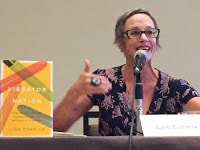 I wonder if there are two types of seniors: those who love their sex-toy shops, and those who haven’t discovered yet how wonderful these stores are. If you’re in the second camp because you imagine (or remember from your youth) a dark, seedy, sticky-floored space with leering salespeople, customers wrapped in raincoats, and gaping orifices on the shelves, you’re in for a delightful surprise. In Vibrator Nation: How Feminist Sex-Toy Stores Changed the Business of Pleasure, Lynn Comella, Ph.D. has accomplished a rarity: a peppy, sex-positive history book chronicling the emergence and evolution of feminist sex-toy shops.
I wonder if there are two types of seniors: those who love their sex-toy shops, and those who haven’t discovered yet how wonderful these stores are. If you’re in the second camp because you imagine (or remember from your youth) a dark, seedy, sticky-floored space with leering salespeople, customers wrapped in raincoats, and gaping orifices on the shelves, you’re in for a delightful surprise. In Vibrator Nation: How Feminist Sex-Toy Stores Changed the Business of Pleasure, Lynn Comella, Ph.D. has accomplished a rarity: a peppy, sex-positive history book chronicling the emergence and evolution of feminist sex-toy shops.This is a book about feminist invention, intervention, and contradiction, a world where sex-positive retailers double as social activists, commodities are framed as tools of liberation, and consumers are willing to pay for the promise of better living through orgasms.
Eavesdrop on the conversations and struggles about what a feminist sex-toy store should stand for, what the politics should be, whether or not to sell porn, and if so, how to choose it, how to be education-based and still sell products.
Learn Jennifer Pritchett’s “sweaty sex toy” story. In 2003, the owner of Minneapolis’s first feminist sex shop, Smitten Kitten, opened a shipment of toys that degraded and leached greasy, noxious chemicals. This led Pritchett to spearhead the anti-toxic-sex-toy movement. “That’s when Smitten Kitten’s mission changed from being just another sex-positive, educationally focused feminist sex shop to becoming a business committed to environmental justice and personal health”
Lynn Comella is an associate professor of gender and sexuality studies, a researcher and expert on the adult entertainment industry, a writer on sex and culture. She immersed herself in sex-toy retail culture while researching Vibrator Nation, including selling sex toys at Babeland to get the inside experience. I’ve had the pleasure of hearing her speak several times, and she’s smart and sassy, a delight. This attitude and liveliness is as strong in her writing as in her public speaking.
You’ll not only learn about sex-toy stores, you’ll also get some cool sex-education quotes. For example:
“A sex-positive person appreciates that human sexuality is endlessly diverse — there is no right way to have sex and no singular definition of normal.” – Lynn Comella
“In those days, when we were discussing vaginal and clitoral orgasms, we used to say that the only people who reliably have vaginal orgasms are men.” – Joani Blank, founder of Good Vibrations.
“When women talk about sex, it changes the culture.” – Carol Queen
“Doing what ‘comes naturally’ for us is to be sexually inhibited. Sex is like any other skill — it has to be learned and practiced. When a woman masturbates, she learns to like her own genitals, to enjoy sex and orgasm, and furthermore, to become proficient and independent about it.” – Betty Dodson
“The worst sexual problem we have — our worst sexual dysfunction… [is] our inability to talk about sex.” – Joani Blank
I love today’s feminist sex-toy shops. They curate their products carefully for our health and pleasure. They provide sex education to their customers. They believe that sexual pleasure is everyone’s right, whatever the age, gender, sexual identity, orientation, kink, needs, desires, abilities, relationship structure, and whatever else should be in this list.
Some of these stores hire me to speak, proving that they agree with my assertion that sex has no expiration date. They advertise on this blog, voting with their wallets to support my educational mission. Please support them in return! You’ll find them in the right-hand column of this blog, and yes, you can purchase from them online.
Opening Up by Tristan Taormino
Opening Up by Tristan Taormino
Reviewed by
Mac Marshall
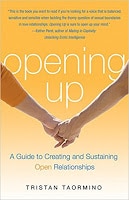 I’m a heterosexual man in my early 70s who’s spent my entire adult life in two monogamous marriages. My wife died recently, and suddenly I found myself a widower embarked on a voyage of self-discovery while adrift in a tumultuous sea of relationships. I don’t wish to remarry, but I definitely do want sexual intimacy and joyful connections with women. How to find these?
I’m a heterosexual man in my early 70s who’s spent my entire adult life in two monogamous marriages. My wife died recently, and suddenly I found myself a widower embarked on a voyage of self-discovery while adrift in a tumultuous sea of relationships. I don’t wish to remarry, but I definitely do want sexual intimacy and joyful connections with women. How to find these?
I’ve discovered Tristan Taormino’s Opening Up: A Guide to Creating and Sustaining Open Relationships. Her book provides a wealth of helpful background on the full range of non-monogamous relationships, and is at once both informative and inspiring.
Taormino covers all genders in all combinations with many examples. She discusses the myths surrounding monogamy (myths I understand only too well), the pros and cons of open relationships, and the range of such connections from partnered non-monogamy to swinging, to polyamory, and polyfidelity. All of these styles of non-monogamy share the basic premise that “one partner cannot meet all their needs and they may want to have sex or a relationship with someone other than their current partner.” Instead of hiding it, they “bring this fact out into the open.”
 |
| Tristan Taormino |
Taormino emphasizes that open relationships only work when these significant elements are present: self-awareness and self-discovery, mutual consent, good communication skills, clear boundaries, honesty, trust, fidelity, and commitment. She addresses issues of possessiveness, control, and jealousy—widely associated with monogamy—emphasizing the importance of relinquishing and overcoming these for non-monogamous relationships to succeed.
She devotes an entire chapter to the idea of compersion as the flip side of jealousy: “compersion is taking joy in your partner’s pleasure or happiness with another partner.” Taormino notes, “Jealousy is a learned behavior. The first step to achieving compersion is to work on unlearning jealousy—letting go of feelings of insecurity, possessiveness, and fear.” While compersion may not be crucial to a functional open relationship, she argues that it is “bound to enhance your relationship.”
I have sufficient self-insight in my 70s to recognize that non-monogamy offers me a path forward toward sexual closeness, non-possessive happiness, and mutual commitment without the encumbrances of marriage and exclusivity. My challenge is to find others who share this perspective and who possess the requisite maturity, self-awareness, communication skills, and commitment to honesty to make a consensual non-monogamous relationship work. Like me, I think that others of you will find Taormino’s Opening Up of great help in charting a course as we venture forth on this journey.
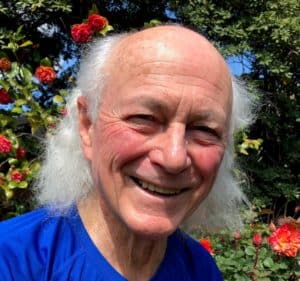
Mac Marshall, PhD is a retired anthropology professor, researcher, and author who is delighted to explore sexuality studies at this time of his life.
Free Fall: A Late in Life Love Affair, an erotic memoir
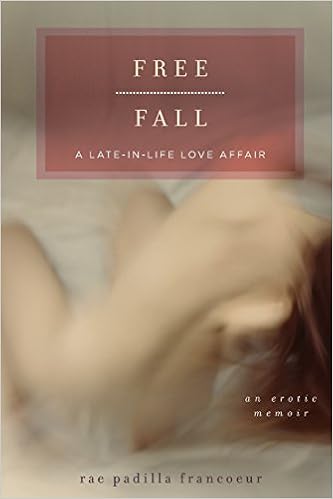 11/1/17: I’m reminding you of this October 2010 book review because I think Rae’s book is brilliant, engrossing, and passionate. I want to be sure you know about this sexy memoir. — Joan
11/1/17: I’m reminding you of this October 2010 book review because I think Rae’s book is brilliant, engrossing, and passionate. I want to be sure you know about this sexy memoir. — Joan
“Where are the books by and for women over 50 that deal honestly with sexuality?” I’ve asked myself for years. Dozens of self-help books for our age group have appeared in the past four years, thank goodness, but where are the sexually honest novels and memoirs that talk about our lives, our passions, our desires, our sexuality, our inner lives? Finally — Free Fall: A Late in Life Love Affair by Rae Padilla Francoeur arrives with honesty and sizzle.
Free Fall is an erotic memoir and much more. Rae Padilla Francoeur, age 58, begins a love affair with Jim, age 67. It’s hot, very hot, explosively hot. Rae describes the passionate details — how he touches and controls her body, how her passions smolder, build, and erupt. As graphic as her details are, I’m pleased that she uses language our generation is comfortable with — penis, vagina — instead of the edgier language that characterizes most contemporary erotica.
And, oh my, this book is beautifully written:
I am shameless. I will slide over every inch of him, kissing him back, wrestling in all that sweat to stay on top. I am sure I will never get enough of him. He will find this out and, being the man he is, he will revel in trying to find the outer limits of my stamina and prowess. He never will.
…
I’ve become so still and quiet and deep in the zone where my brain is one massive sensor hooked into the places he touches and the places I touch. There is nothing else. I’m all body.
…
We’re kissing each other like the end of time is on the other side of the door. We kiss like this for ten or fifteen minutes until suddenly Jim stops it all. He steps back. He pulls my skirt over my hips. He takes my hand and places it on his penis.
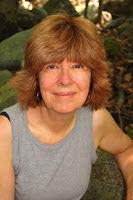 |
| Rae Padilla Francoeur |
Free Fall: A Late in Life Love Affair is one of the best books I’ve read in years. I hope you’ll read it for yourself, and let us know what you think.
Notable 2016 Sex Books
Inviting Desire: A guide for women who want to enhance their sex life by Walker J. Thornton, is a self-help book of tips, tools, questions, and exercises that help you understand and own your sexuality after the shifts you’ve experienced after menopause. It’s written as a 30-day process to invite desire and sexuality back into your life, and help you examine new ways to think about sexual desire, prepare for sex, understand your own arousal pattern, and accept yourself as a sexual being. Thornton’s tone is soft-spoken and intimate, sharing the practices that she has learned along her own journey. “This is about you, your body, and your desire,” writes Thornton.
Thornton covers many useful topics in her 30-day journey. You’ll learn more about yourself as a sexual being as well as tools for making changes. Although Thornton says, “it’s for you, not you and a partner” and the exercises are done independently, the book is geared to women who have partners or partners-to-be. If you’re solo, some of the practices won’t apply, but you’ll still learn new ways to think about your own body, your own desire, and your own pleasure.
Future Sex: A New Kind of Free Love by Emily Witt. Single, in her thirties, and (sometimes) enjoying the hook-up culture, Emily Witt decides to observe and participate in other ways that people enjoy sex. She explores Orgasmic Meditation, the making of porn, sex parties, and Burning Man, for example. If you liked America Unzipped and Secret Sex Lives, you’ll enjoy this one, too. Some of Witt’s discoveries/conclusions:
- “Some experiences you avoid not because you know you don’t like them but because you don’t want to like them…My aversion to pornography was not because the images didn’t stimulate, but because i did not want to be turned on by sex that was not the kind of sex I wanted to have.”
- “I think if someone were to draw a portrait of the people who were ‘ruining Burning Man’ it would have looked like us.”
- “I now understood the fabrication of my sexuality. I saw the seams of its construction and the arbitrary nature of its myths…Just as wanting to fall in love did not manifest love, proclaiming myself ‘sexually free’ would not liberate me from inhibition.”

I recommend this well-written and buoyant book especially for readers who want a gentler, more one-step-at-a-time pace in rediscovering their sex lives than I often promote. Whereas I may seem to push you into a “just do it” attitude whether talking to a partner or a doctor or self-pleasuring with sex toys, I know that many of you might appreciate a more gradual approach. This book may be just right for you.



